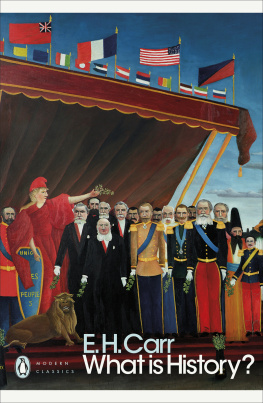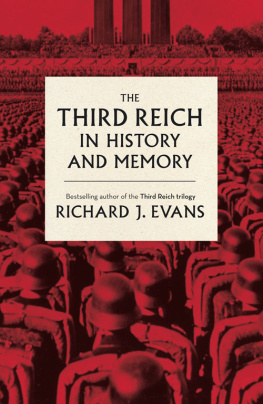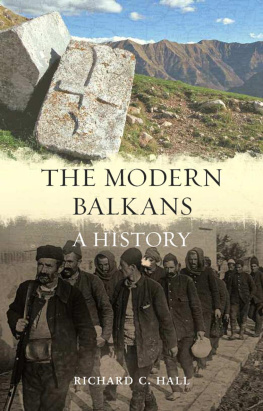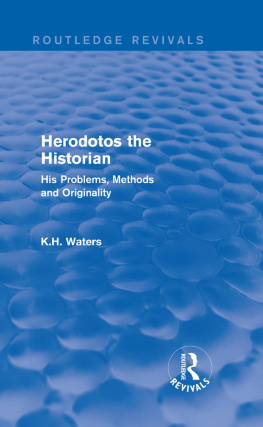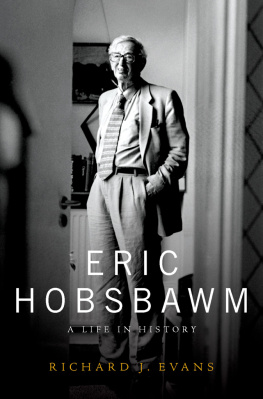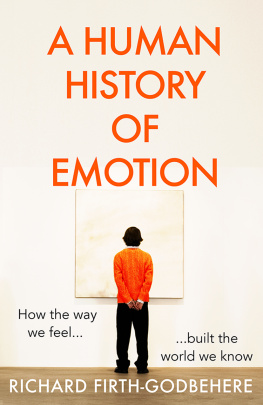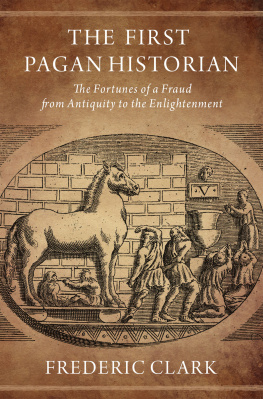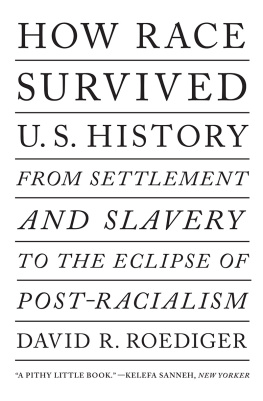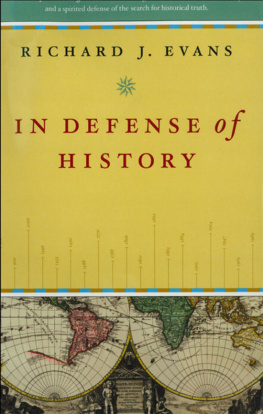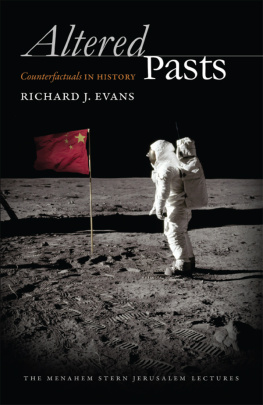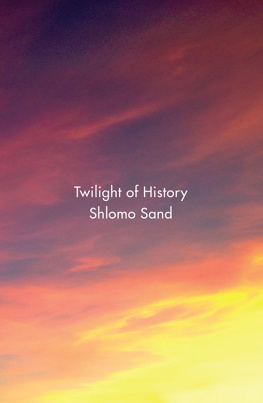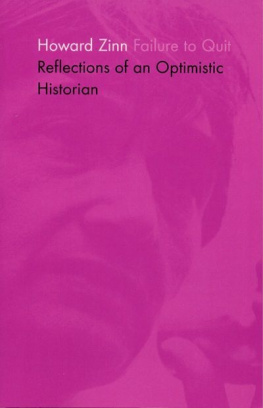PENGUIN MODERN CLASSICS
WHAT IS HISTORY?
Edward Hallett Carr was born in 1892. He joined the Foreign Office in 1916 and worked there in many roles until 1936 when he became Woodrow Wilson Professor of International Politics at the University College of Wales, Aberystwyth. After the war he became a Fellow of Balliol College, Oxford and then of Trinity College, Cambridge. His major work was the fourteen-volume A History of Soviet Russia (published 195078). What is History? is based on his Trevelyan Lectures, delivered in 1961. He died in 1982.
E. H. Carr
WHAT IS HISTORY?
The George Macaulay Trevelyan Lectures delivered in the University of Cambridge JanuaryMarch 1961
With an Introduction by Richard J. Evans
PENGUIN CLASSICS
UK | USA | Canada | Ireland | Australia
India | New Zealand | South Africa
Penguin Books is part of the Penguin Random House group of companies whose addresses can be found at global.penguinrandomhouse.com.
First published by Macmillan in 1961
Published in Pelican Books 1964
Second edition published 1987
Reprinted with a new Introduction by Palgrave 2001
Published in Penguin Classics 2018
Copyright Edward Hallett Carr, 1961
Copyright The Estate of Edward Hallett Carr, 1987
Editorial matter and selection for the second edition copyright R. W. Davies, 1987
Introduction to this edition copyright R. J. Evans, 2001
Cover: The Representatives of Foreign Powers Coming to Salute the Republic as a Sign of Peace, (detail) 1907 by Henri Rousseau. Musee Picasso, Paris/Bridgeman Images
ISBN: 978-0-241-35190-1
I often think it odd that it should be so dull, for a great deal of it must be invention.
CATHERINE MORLAND on History (Northanger Abbey, ch. xiv)
Introduction
Richard J. Evans
I
E. H. Carr (18921982) was not a professional historian in any sense of the term that would be acceptable today. He did not have a degree in History. He never taught in a History Department at a University. At Cambridge before the First World War he studied Classics. He later confessed that he had no interest in history at the time. He did not take a Ph.D., nowadays the conventional route into the academic profession. On graduating in 1916, he went straight into the Foreign Office, where he remained for the next twenty years. During this time, he occupied his leisure, of which he seems to have had a great deal more than would be allowable nowadays, in writing biographical studies of nineteenth-century Russian writers and thinkers. He published a book on Dostoevsky in 1931, a study of Herzen and his circle (The Romantic Exiles) in 1933, and a biography of Michael Bakunin in 1937. He also began to write book reviews and articles on contemporary diplomacy. When in 1936 he resigned from the Foreign Office to take up a Chair at Aberystwyth University, it was to become Professor not of History but of International Relations.
In this guise, Carr became known for a number of short but influential works on foreign policy, most famously, perhaps,
Carr thus approached history from the angle of someone who had spent his life working for the Foreign Office and for a national newspaper. These influences and experiences strongly coloured his views about history and how it should be studied. He came to this subject relatively late in life. He embarked on his only major historical work, a History of Soviet Russia, published in fourteen volumes between 1950 and 1978, when he was in his fifties, and by the time he came to write What is History? he was already well past retirement age. He later claimed that his interest in history originated in the Russian Revolution itself, which he had viewed from afar as a junior clerk in the British Foreign Office in 1917. But it lay dormant for many years, until it was finally and decisively reawakened during the Second World War, when, like many others in Britain, though more thoroughly and permanently than most, he was converted to an admiration of and preoccupation with Soviet Russia on the entry of that country into the war as an ally of Britain in June 1941.
As he researched and wrote his study of Soviet Russia, Carr took up this insight and attempted to grapple with the theoretical problems which his project posed, in a series of articles written for The Times Literary Supplement in the course of the 1950s. The first of these was the question of objectivity. This was particularly important to him in view of the fact that by the time he came to publish the first volume of his history, in 1950, opinion on the Soviet Union was completely polarized between Communists, who would brook no criticism of it, and portrayed everything in its development as justified and inevitable; and the Cold War warriors of the West, who saw Communism as a threat to human rights and democratic values no less severe than that posed earlier by Nazism, and damned the development of the Soviet Union as a disastrous aberration.
Carrs History of Soviet Russia was a pioneering attempt to reconstruct in detail what happened in Russia between 1917 and 1933 from the available sources. It was also a serious attempt at steering a course between the opposite poles of Cold War polemics and delivering an account that could be regarded as scholarly and objective. But how should objectivity be defined in such a situation? In 1950, as the first volume of his monumental work was being published, Carr proclaimed boldly: Objective
However, the problem was not so easily solved as that. In a review of the eminent diplomatic historian G. P. Goochs History and Historians in the Nineteenth Century, a book first published in 1913 and reissued with a new Preface forty years later, Carr noted its unflagging faith in the possibility of establishing the facts and in the value to humanity of the facts, once established. Such faith was a product of Goochs training in the German historicist tradition of the nineteenth-century scholar Leopold von Ranke, in which the historian was taught to portray the past as it really was. Yet the Gooch of 1952, continued Carr,
knows that the world has moved far in the past forty years, and that it is no longer possible for the present generation to accept this absolute and unqualified faith in the pre-eminence and in the saving grace of historical facts It will no longer be questioned that our search for the facts of history, and our identification of those facts when found, are necessarily determined by the perhaps unconscious beliefs and presuppositions which guide the search. The very conviction that facts are neutral, and that progress consists in discovering the facts and learning lessons from them, is the product of a rational-liberal outlook on the world which cannot be so easily taken for granted to-day as it was by our more fortunately placed nineteenth-century ancestors.
At the same time, however, Carr conceded that the distortion of history by the Stalin regime in the Soviet Union, and its mutilation of documents and doctoring of the historical record, meant that freedom to know was more important than ever.
Carr returned to the unresolved tensions evident in this article a few months later and tried to drive his thinking a few steps forward. What was the relationship between the historian and the facts? he asked in another

